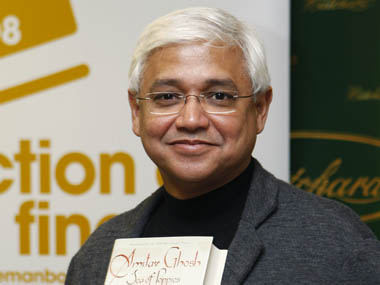Acclaimed Indian author Amitav Ghosh, who is in India to commemorate 25 years of his book Shadow Lines, has categorically said that having BJP nominee Narendra Modi in the highest seat of the country would be ‘deeply destabilising’ for India. He made the comments to CNN-IBN deputy editor Sagarika Ghosh on Thursday. [caption id=“attachment_1113711” align=“alignleft” width=“380”]
 File photo of Amitav Ghosh: Reuters[/caption] In an interview that encompassed subjects from Hindu nationalism to the politics of identity and freedom of expression to the themes and sub themes of his novel, Ghosh expressed his ‘horror’ at the way Hindu nationalism had transformed faith into politics. “I see no piety in it, no genuine love of spiritual attainment. Such an intense tradition in Hinduism is actually bhakti - love. And there seems to be so little of that, even as something remembered in this kind of political movement,” he said. “What is most worrying about Hindu nationalism is that is taking away what I grew up in. It portrays Hinduism in a different light,” he added. As for Narendra Modi, Ghosh said that while it was for the courts to decide the level of responsibility he bore for the 2002 riots, the fact remained that the ‘appalling’ event took place on his watch and he was therefore culpable. “For someone with that past to occupy the highest seat in the country would be deeply destabilising”, he said, adding laughingly in response to a follow up question, that Modi would never get his vote. Ghosh also said that the tradition of pluralism in India was the only thing that was keeping the country together, adding that what had happened in Pakistan and Sri Lanka were warnings of what could occur if one religion or language were held above others. He added that the politics of identity were deeply damaging, especially since humanity as a species was facing its biggest threat - namely that of climate change. Watch the entire interview below:
File photo of Amitav Ghosh: Reuters[/caption] In an interview that encompassed subjects from Hindu nationalism to the politics of identity and freedom of expression to the themes and sub themes of his novel, Ghosh expressed his ‘horror’ at the way Hindu nationalism had transformed faith into politics. “I see no piety in it, no genuine love of spiritual attainment. Such an intense tradition in Hinduism is actually bhakti - love. And there seems to be so little of that, even as something remembered in this kind of political movement,” he said. “What is most worrying about Hindu nationalism is that is taking away what I grew up in. It portrays Hinduism in a different light,” he added. As for Narendra Modi, Ghosh said that while it was for the courts to decide the level of responsibility he bore for the 2002 riots, the fact remained that the ‘appalling’ event took place on his watch and he was therefore culpable. “For someone with that past to occupy the highest seat in the country would be deeply destabilising”, he said, adding laughingly in response to a follow up question, that Modi would never get his vote. Ghosh also said that the tradition of pluralism in India was the only thing that was keeping the country together, adding that what had happened in Pakistan and Sri Lanka were warnings of what could occur if one religion or language were held above others. He added that the politics of identity were deeply damaging, especially since humanity as a species was facing its biggest threat - namely that of climate change. Watch the entire interview below:
Narendra Modi is culpable for 2002 Gujarat riots: Amitav Ghosh
FP Staff
• September 17, 2013, 09:31:48 IST
Ghosh expressed his ‘horror’ at the way Hindu nationalism had transformed faith into politics. “I see no piety in it, no genuine love of spiritual attainment. Such an intense tradition in Hinduism is actually bhakti - love.
Advertisement
)
End of Article